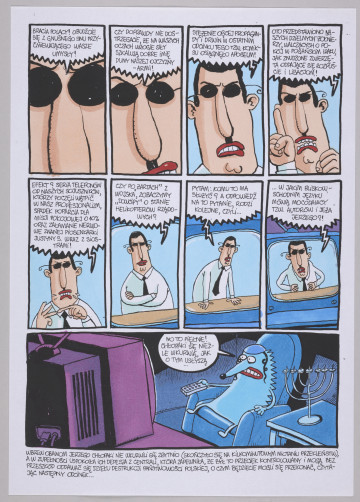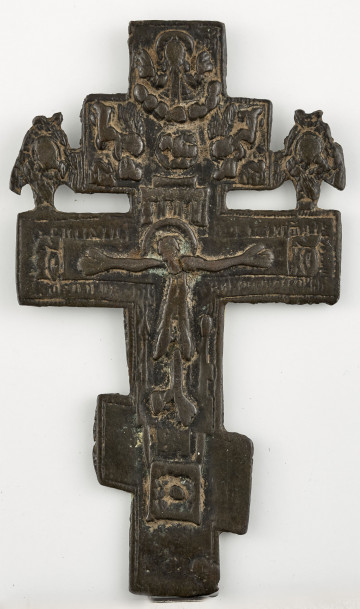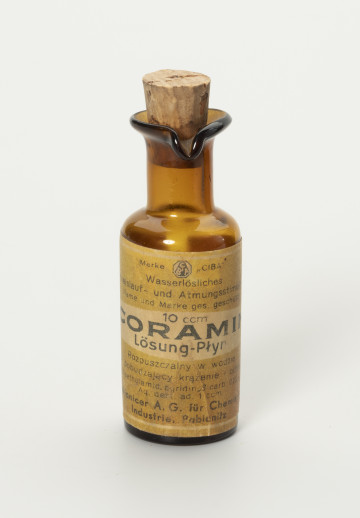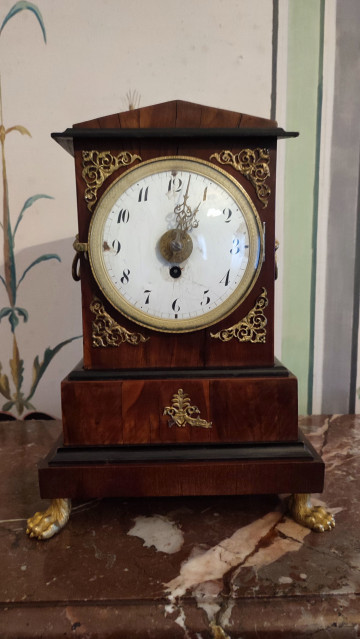
The Polish Brothers… - color version
2005
Museum of the history of Polish Jews
The comic book in two versions: uncoloured and coloured for the comic book album "Ziom" (The Compatriot). (2005, 2nd edition: 2011) from the series Jeż Jerzy (George the Hedgehog) by Rafał Skarżycki (scripts) and Tomasz Leśniak (illustrations), which started in the mid-1990s. The comics, among other things, take up the issue of Polish nationalism in the form of blunt caricature.
Radical anti-Semitism of various antagonists of Jeż is a leitmotif of the series. For example, in the comic strip "Nie dla dzieci" (Not for Children) (2002, 2nd edition: 2011) two skinny-skinned nationalists Stefan and Zenek, characters appearing in all comics of the series, enjoy the idyllic view of - as they comment - "the beautiful Polish sea - wonderful water, a paradise beach, wonderful Polish women who will soon give birth to wonderful Polish children" (they are dressed in swimming trunks in the colours of the Polish flag with an eagle in the middle of the front part of the costume; as always, Stefan has an exposed swastika tattoo on his arm, and Zenek wears a Celtic cross on his neck). However, Zenek suddenly notices the Hedgehog lying on the sand. "- That's really terrible! - What's that? | An Arab? A black man? - Worse! | A JEW? | I'm not sure...". (see p. 43 in the 2nd edition). In "Ścigany" (The Chased) (2003, 2nd edition: 2011), in the scene where, chasing the Hedgehog, they run into a concert of the Cool Kids of Death (Krzysztof Ostrowski is singing the song Uważaj (Watch Out)), Stefan states: "I have the impression that we have accidentally discovered the very centre... | ...of a Semitic conspiracy against Poland!!!" (argumentation: "Just listen to these lyrics: anarchy, anti-Slavic pronunciation, incitement to revolt! And on top of that an un-Polish name!"; p. 44 in the 2nd edition).
The sheet, the originals of which are in the collection of the POLIN Museum, belongs to the scene (see p. 20 in the 2nd edition, 2011) with the fullest verbalisation in the whole series of the suspicion that Jeż Jerzy and his creators are at the centre of this conspiracy. It is formulated by the figure of a demagogue, also recurring throughout the series, warning the public in extensive television addresses about the socially disastrous impact of Jeż Jerzy as early as 1995 (see the short form reproduced in the album-like anthology "Dokument" (The Document), 2004, 2011 - on pp. 16-17 in the 2nd edition; the politician is sitting against a wall with images of Father Tadeusz Rydzyk and Andrzej Giertych).

1750 — 1850
Castle Museum in Łańcut

1901 — 1939
National Museum in Szczecin

XIX century
Castle Museum in Łańcut
DISCOVER this TOPIC
National Museum in Lublin
DISCOVER this PATH
Educational path